Reading Time: 12 minutes
Mitali tells us that a swanky restaurant in China had no toilet, while a house had a musical toilet. She talks of musical gadgets, automatic doors, a language where accents could make or mar meanings, among other things. She moves to different countries recalling China. An exclusive for Different Truths.
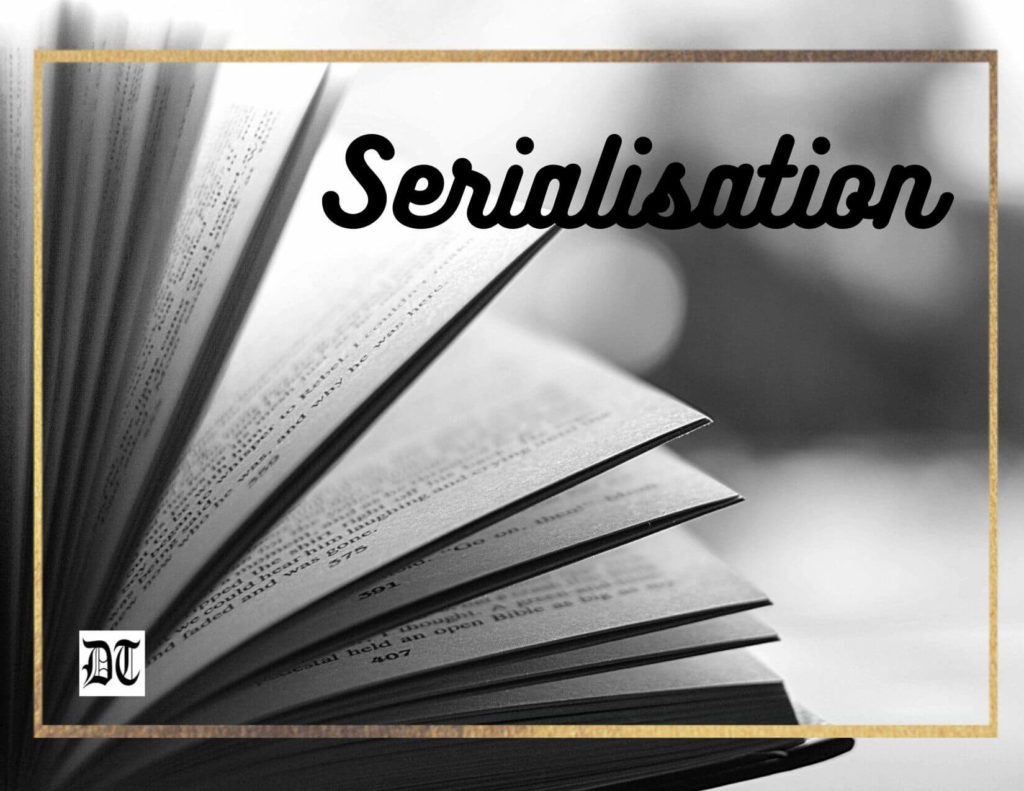
I remember traveling to India once on the day of Beating the Retreat1.
Sometimes, the Chinese New Year holidays coincided with India’s Republic Day2 and Beating the Retreat celebrations. Technically, Republic Day started post-independence as did Beating the Retreat. In 1950, India became a republic when it did away with all the tiny kingdoms within its domain. It declared itself a democracy. Sometimes, watching The Crown3 on Netflix, one wonders if politicians are better than monarchs – after all they pretty much get to do what they like and it is only the commoners who suffer, whether from dictatorship or democracy.
But the story I am telling is not about the choices made by countries but by the airlines.
While we dozed in the aircraft on our way to India, Aditya, who was watching the route on the screen in front of him, told us, the plane was off route. We had opted for a direct flight to Delhi long before the march past of Beating the Retreat started. There were no announcements. We told him to relax. Then the plane started losing height at some point, no announcement still. We checked. Aditya was right. Now, we were worried. Then I called an air hostess and asked. She pretended that she did not know. She asked me if I would like some water or something to drink.
Then at last, there was an announcement. We were landing in Bombay – no reasons given. We were told it was a short break and we would resume our journey soon.
We got off. It was the old Bombay airport. That time I remember the food was really bad and the bathrooms wet. We reached Delhi late – someone told us there was a fly-past in the morning. Someone said fog and poor visibility.
The pollution index in China touched 400 PSI sometimes. It was really bad in 2013-14. It was difficult to breathe outdoors.
That is what China too had around the same time. Poor visibility. The pollution index in China touched 400 PSI sometimes. It was really bad in 2013-14. It was difficult to breathe outdoors. We had air purifiers running at home to prevent us from falling sick. However, when we had first gone to China in 2006, the Beijing Olympic games were close. The Beijing Summer Olympics in 2008 meant clean air for China. The first time I went to Beijing, a few months before the Olympics, the air was really clean. Cloud seeding had worked wonders, I had heard. It was lovely to spend the whole day on my patio. I loved the hum of birds and bees and the colours of the flowers in my garden. I also liked working in the garden. That was a problem, I was told by my housekeeper. Tai tais (madams) do not work. My Swedish neighbour would wash her patio in summer with all the workers lined outside the hedge that defined the boundary watching her wash. To them, it was a culture shock!
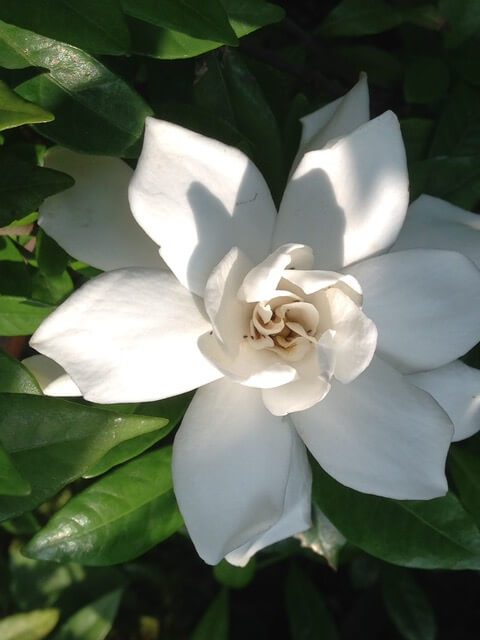
As laowais (foreigners), we also had our round of culture shock – but of a different kind. There were certain things in China which weren’t found elsewhere, like doorless public toilets when we went in 2006. Though when we returned in 2014, the same shopping mall had toilets with doors but not all of the local users bothered to close them.
My mother-in-law was visiting. I had taken her to what seemed to be a high-quality Hong Kong restaurant beside a canal – Suzhou has many canals. My mother-in-law wanted to use the washroom. I asked them where the washroom was. They said, “Mei you.” “Don’t have,” I translated for my mother-in-law. She did not want to believe it. She asked me to ask again in Chinese. They said, “Mei you.” I translated, explaining that they don’t have a bathroom in the restaurant. I said if she was desperate, we could go to the mall. No. She was not desperate, but she found it hard to believe. Every country she had visited had restaurants with bathrooms. She had been to Singapore, Malaysia, South Africa, and China, and she lived in many places in India. This was a new experience for her. She made me ask for the non-existent bathroom five times. And she made sure I asked five different waiters. She could not believe me. After the meal, when we were leaving, she wanted to explore the second level of the restaurant to look for a bathroom.
“You probably didn’t ask correctly” was her verdict. I was truly embarrassed. I rushed her out and took her to the neighbouring mall, which had clean, modern, proper toilets with doors!
Of course, being born in India, that should not have come as a shock because villages in India were not always equipped with toilets.
Of course, being born in India, that should not have come as a shock because villages in India were not always equipped with toilets. I had lived in a couple. In Assam they made makeshift toilets for us, but in a village in Haryana, we had to accompany the women to the fields at 4 am in the morning. There is a movie I know called, Toilet, which really deals with the issue as it is. Well, I think more than me, my mother-in-law was shocked because she had never been to a toilet-less place!
Toilet histories are always an interesting read for young gentlemen, and they do get hold of these things wherever you live. Histories of unsanitary toilets4 and filthy habits made my sons laugh. Toilets as we know it now came into use much later5.
I had heard of gold-plated toilets in Hong Kong, but in Suzhou, I came across a house with a musical toilet bowl. The toilet seat sang and opened and closed every time you walked past!
The modern world has now luxury in toilet ware too. I had heard of gold-plated toilets in Hong Kong, but in Suzhou, I came across a house with a musical toilet bowl. The toilet seat sang and opened and closed every time you walked past! It was like the toilet seat was waving at you and inviting you to sit on it. Another house I saw had a high-tech computer-controlled flushing system that I never had the guts to explore. Then there was a house with a huge bathtub that had an attached TV. Or was it a computer screen? This house also had a toilet for men and a separate one for women downstairs. I never quite figured out why! They were like public toilets.
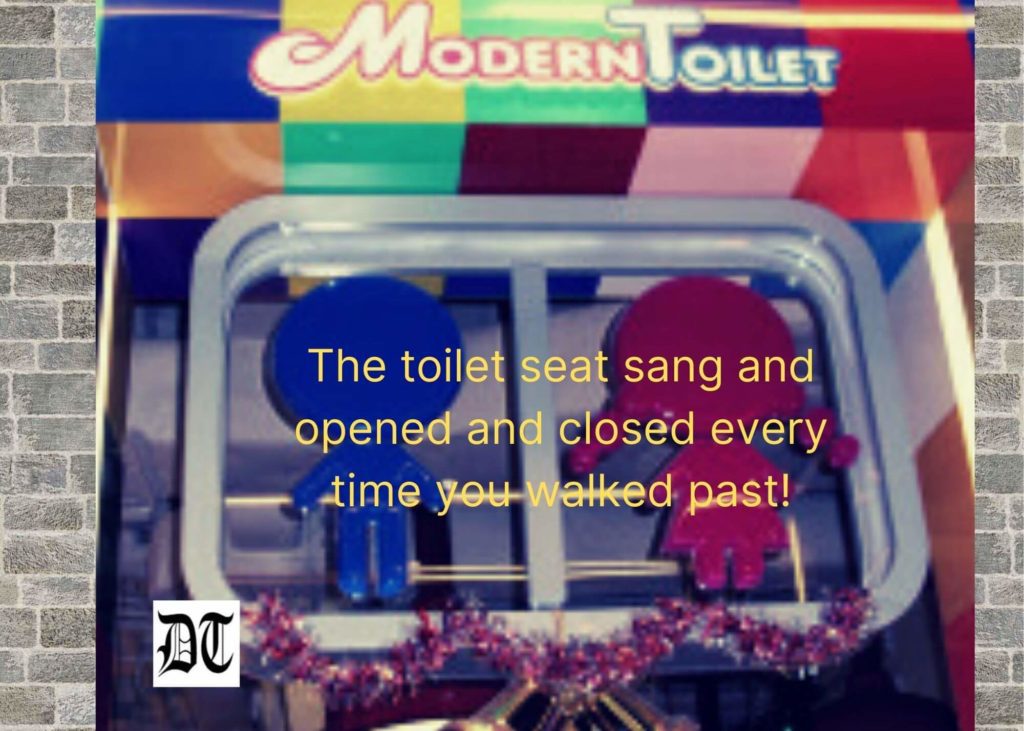
The houses I lived in thankfully did not have these features. Instead, the last one had a musical washing machine that sang when the clothes were done; a fridge that, if left open for a little longer, started to play a tune; and a microwave that turned musical to indicate it had completed its job. And the tunes persisted till you attended to the gadget!
Then, we encountered high-tech front doors. They were computerized doors. Unfortunately, sometimes they did not work. We once went to see a house where the front door couldn’t be unlocked because the computer was malfunctioning. The agent took us in by the back door. We also lived in a flat for two years with a high-tech back door that got jammed at first. Then when they opened it, they couldn’t close it. They said we were not using the door properly. It was the first time I had heard that you needed training to open and close a door!
Apartments with high tech doors often had sensitive lights! When under such a light, you had to keep prancing around to make your presence felt.
Apartments with high tech doors often had sensitive lights! When under such a light, you had to keep prancing around to make your presence felt. Most of these lights lit up when there was movement. They were used in the common dark corridors near the lifts of high-end condominiums. It felt a bit peculiar when you had to keep doing a hornpipe in front of your friend’s flat till the door was opened. You just hoped their neighbours would not come out and see you doing your jig.
We sometimes viewed houses with fourteen or more rooms, counting from the basement. The house with the computer-screen bathtub had a room within a room within a room. It was unbelievable that designs could be so complicated. They did try to have houses dubbed by regional names: European housing, American housing, traditional Chinese housing and of course flats. But issues faced were similar in all houses – and they did get fixed only you had to know the ‘how’ of getting it done. By and large, the country seemed to have resolved its housing issue. Even our drivers, gardeners and housekeepers had at least one if not more flats, winter wear and enough food — provided they did not squander the money on drink or gambling.
China, like Shanghai, is essentially a mix of old and new cultures. This could be seen in the choice of cultural performances that often dotted the streets of town centres or parks. One of the most amazing experiences we had was in the park of the Temple of Heaven in Beijing. On one side, we had hip line dancing to the latest Bollywood song and on the other music with traditional erhu (a two-string fiddle, traditional Chinese instrument) accompanying tai chi, a form of Chinese exercise, which is performed slowly to music. What is important is that all of this seems to harmonise together. In Chengdu, we heard some fabulous singing on the roadside from old folks.
The harmonisation of the traditional and the modern takes astounding forms in China.
The harmonisation of the traditional and the modern takes astounding forms in China. A seemingly modern Chinese, one who would call himself a free thinker, would continue to feel the need of parental approval for major decisions like jobs, relocation, and marriage. They also had rituals at death, marriage, birth, Chinese New Year, and the May 1st and the October 1st holidays, which they followed like a religion. The modern educated Chinese saw themselves as free thinkers. Most of their holidays were essentially secular, though people observed them ritualistically like a religion. They went out. Trains and flights were overbooked. Hotels were jam-packed. Restaurants, especially the big Chinese ones, were overflowing. People would have a good time. When the holidays finish, they would get back to work.
It is a systematic society that moves within a given framework of suits and ties.
One of the major issues in China was the language barrier. There were many schools to teach foreigners Chinese. Unfortunately, most of these focussed on the official Mandarin language – even though each region had its own dialect, and much of the grey population was not comfortable with Mandarin. Where I lived, they spoke Suzhouhua. When I spoke to my gardener, he partially understood me. My driver had to manage the dialect to explain things to him. At every bend of daily life, one found linguistic challenges that needed to be sorted out. There were also complex accents. Wen (pronounced as “one”) means “to ask.” The same word pronounced as “wo-un” means to kiss. So, you really needed to be careful with your accents! When I experimented with the language, I was often corrected by my son and by my first housekeeper. She spoke perfect Mandarin because that is what they speak in Xian. My second housekeeper spoke bad Mandarin but fluent Suzhouhua – she was excellent at managing workers who visited my home for various reasons.
One of the things I missed most in China were bookstores with English books.
One of the things I missed most in China were bookstores with English books. They were a few in number and online stores did not function within China on the local network. You could not get books on Amazon easily. When we reached China, I remember Wikipedia was not available. Aditya was sad because that is something the ten-year-old loved. Then, around the Olympics at Beijing, Wikipedia started and Google, and Gmail seemed to be intermittent.
We did not get YouTube or Facebook directly, only with the help of a virtual private network (VPN). Television channels legally were all in Chinese, except for one, which relayed some English programmes. We did get satellite TV. The landlords arranged it for foreigners, but it was not really allowed, agents said. Satellite TV was often interrupted. It would be smooth for a while and then stop. It could be disconnected for a number of reasons, including what would be perceived as a threat to China. However, I had heard that legal satellite TVs did exist in China but were only allowed in hotels and educational institutions.
I do not know if that is such a bad thing technically. I lived avoiding Facebook till a school friend of mine based in London lured me into it with the temptation of accessing old classmates. And then began my woes. There were too many voices on Facebook. I would call it noise. I continued to feel it took away from the harmony of our lives. I liked not knowing things about people and I did not want my life to be an open book for a few thousand who know me only virtually. To date, I only like to share my writing on FB – I like my life outside it. FB started as a site for Harvard students to mingle and socialise6 in 2004 and today there are more than two billion users who thrive within the Facebook community.
In China, though Facebook, social media or search engines as we know them are not allowed, they have an equivalents7 of FB, WhatsApp, YouTube, Twitter, Google and more.

In China, though Facebook, social media or search engines as we know them are not allowed, they have an equivalents7 of FB, WhatsApp, YouTube, Twitter, Google and more. The majority of the population of China remained untouched by the cultures and customs of the outside world for the eight years we spent there. To maintain this pristine balance and have most of the people think in sync with them, the Chinese government implemented media monitoring. For the expats who had been exposed to so much of media, they had a little more leeway: the VPN.
You had to empathise with the historical context of the country to figure out the Chinese thought processes. They came from a culture that was deeply deprived and exploited by the rich and powerful. They had no sense of democracy for centuries while the concept flitted in and out of world history starting with ancient Athens8. Mao, a teacher by profession, rose to power and dislodged the Kuomintang regime, pushing it into Taiwan, which is still perceived as a part of China by the local government. Post Mao came the opening up, and then a flood of foreigners with strange customs, bringing money and many lucrative jobs. China had raced at a breakneck speed. Xi Jinping9, despite his six year stint in an agricultural commune during the cultural revolution, inherited an affluent nation. Once a population of have-nots, they have now emerged as consumerist masses of haves – who love to shop, dress up, party, and catch up on all the fun they missed over the centuries of toil and the building of the Great Wall, a marvel of human construct which balances the natural and the artificial to perfection.
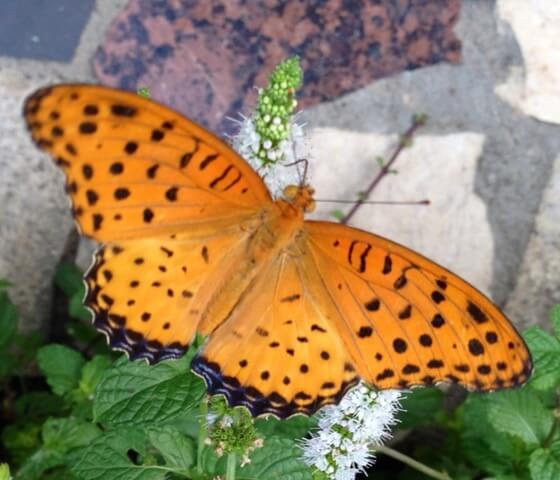
Most Chinese gardens are also an interesting mix of the natural and the artificial. This was a style they translated to gardens in homes too. Like in ours, we had the pond and rock structures that Surya and his friend thought they could hack! We also had exotic flowers which I have never seen outside of China, and huge lush insects on the hedges – green and fat. We had oranges, beans and mint along with bouquets of flowers in the garden. I wondered if this plenty was an outcome of the mists, an abundance which depicted in ancient Chinese embroideries and paintings had given them an exclusivity.
We experienced a fog in winter – not just pollution but mists. It was as if the clouds hung low and we glided into them.
We experienced a fog in winter – not just pollution but mists. It was as if the clouds hung low and we glided into them. The colours seemed to fade into faint pastel shades almost a whitish shade of pale. This was different from the mists in San Francisco and the Bay area, or the fog in Delhi, which is more like a smog. But just low-lying moist clouds hanging about highways and interrupting traffic flows. Highways in winters would close not just for snow but also for fogs. They were so thick that if you stretched out your arms, you would not see them. In winters like these, the trees turned bare. But perhaps, the mists that wrapped them gave them enough moisture to bloom bigger.
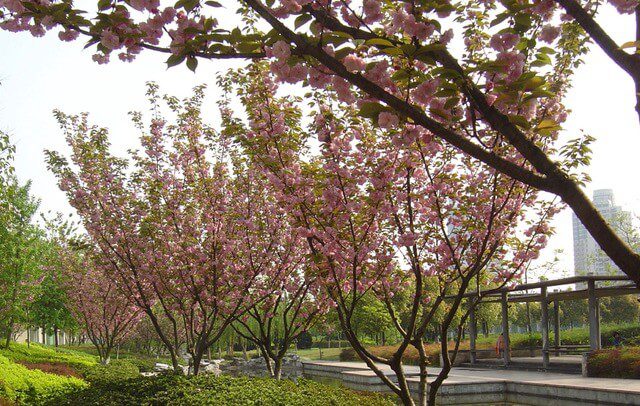
In spring, our compounds turned pink with cherry blossoms. In the first compound, the small stream that ran through it lined by cherry blossoms and weeping willows turned pink with fallen flowers. You could not see the water for the flowers floating in it! In the last house we rented, there was this mauve tree in my garden near the pond which broke into floral bouquets every spring, before the leaves sprouted each summer.
Sometimes, I think I can see such trees in Singapore, lining the walk along the river in front of my house, interrupted by pinks too – but I am not sure, these are the same. But those are moments when my mind travels back to the China we experienced, against the China of today… I am glad we are not there anymore. It would have been difficult to reconcile to political developments that lead to only anger and distress in the world. We normally interacted with common people. Common people and expats kept out of politics. Expats were seen as conduits of generating jobs and money for the local population. It was a life that was much like the colonials at the start of the movie based on JG Ballard’s novel, The Empire of the Sun10 — a life in a bubble that we knew could burst at any point but while it lasted, we enjoyed it.
Had it all been real? Or, had it, like the mists we had in winter, been there just to moisten our sensibilities towards a world we could still build? It could be a world in harmony that would transcend the artificial borders we ourselves have superimposed with each civilisation vying for superiority over the other. It made me learn to dream – dream of a world that could be ours – a future where humans would transcend differences and learn to survive as one species – One World.
References
3 https://www.netflix.com/sg/title/80025678
5 https://www.smithsonianmag.com/history/turrets-toilets-partial-history-throne-room-180951788/
6 https://www.history.com/this-day-in-history/facebook-launches-mark-zuckerberg
7 http://blog.tutorming.com/business/chinese-social-media-sites
8 https://www.britannica.com/topic/democracy
9 https://www.britannica.com/biography/Xi-Jinping
10 https://www.washingtonpost.com/wp-srv/style/longterm/movies/videos/empireofthesunpghinson_a0a8cf.htm
Photos by the author and visuals by Different Truths
















